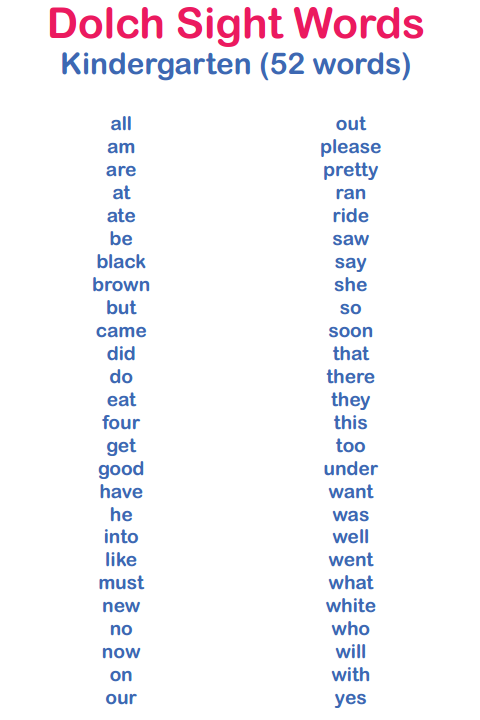sight words kindergarten
Sight words for kindergarten are frequently occurring words that kids learn to recognize quickly. They help build reading fluency and comprehension, focusing less on decoding and more on meaning. Examples include “the,” “and,” “is,” and “in.”
- Sight words kindergarten PDF
- Buy sight words kindergarten
- Ask AI anything about sight words kindergarten
- Related websites
sight words kindergarten PDF

all, am, are, at, ate, be, black, brown, but, came, did, do, eat, four, get, good, have, he, into, like, must, new, no, now, on, our, out, please, pretty, ran, ride, saw, say, she, so, soon, that, there, they, this, too, under, want, was, well, went, what, white, who, will, with, yes
all, am, are, at, ate, be, black, brown, but, came, did, do, eat, four, get, good, have, he, into, like, must, new, no, now, on, our, out, please, pretty, ran, ride, saw, say, she, so, soon, that, there, they, this, too, under, want, was, well, went, what, white, who, will, with, yes
(52 words in total)
Buy sight words kindergarten
BOB Books SIGHT WORDS COLLECTION Book Box Set [Kindergarten & First Grade]: https://amzn.to/3Va0vK9
Ask AI anything about sight words kindergarten
-
Kindergarten sight words: who
“Who” is a sight word that is commonly taught in early reading programs. It is one of the high-frequency words that children are encouraged to recognize on sight without having to sound it out.
### References:
– Dolch, E. W. (1948). *Problems in Reading*. Champaign, IL: Garrard Press.
– Fry, E. B., Kress, J. E., & Fountoukidis, D. L. (2000). *The Reading Teacher’s Book of Lists* (4th ed.). Jossey-Bass.
-
Kindergarten sight words: white
“White” is a common sight word that appears frequently in early reading materials. It is one of the basic color words that children are often taught to recognize and read by sight.
References:
– Fry, E. B., & Kress, J. E. (2006). *The Reading Teacher’s Book of Lists* (5th ed.). Jossey-Bass.
– Dolch, E. W. (1948). *Problems in Reading*. Southern Illinois University Press.
-
Kindergarten sight words: what
“what” is a common sight word that children are often taught to recognize on sight without having to sound it out. It is frequently used in early reading materials and is essential for building reading fluency.
References:
– Fry, E. B., & Kress, J. E. (2006). *The Reading Teacher’s Book of Lists* (5th ed.). Jossey-Bass.
– Dolch, E. W. (1948). *Problems in Reading*. Southern Illinois University Press.
- Kindergarten sight words: the
- Kindergarten sight words: with
- Kindergarten sight words: will
- Kindergarten sight words: who
- Kindergarten sight words: white
- Kindergarten sight words: what
- Kindergarten sight words: went
- Kindergarten sight words: well
- Kindergarten sight words: was
- Kindergarten sight words: want
- Kindergarten sight words: under
- Kindergarten sight words: too
- Kindergarten sight words: this
- Kindergarten sight words: they
- Kindergarten sight words: there
- Kindergarten sight words: that
- Kindergarten sight words: soon
- Kindergarten sight words: so
- Kindergarten sight words: she
- Kindergarten sight words: say
- Kindergarten sight words: saw
- Kindergarten sight words: ride
- Kindergarten sight words: ran
- Kindergarten sight words: pretty
- Kindergarten sight words: please
- Kindergarten sight words: out
- Kindergarten sight words: our
- Kindergarten sight words: on
- Kindergarten sight words: now
- Kindergarten sight words: no
- Kindergarten sight words: new
- Kindergarten sight words: must
- Kindergarten sight words: like
- Kindergarten sight words: into
- Kindergarten sight words: he
- Kindergarten sight words: have
- Kindergarten sight words: good
- Kindergarten sight words: get
- Kindergarten sight words: four
- Kindergarten sight words: eat
- Kindergarten sight words: do
- Kindergarten sight words: did
- Kindergarten sight words: came
- Kindergarten sight words: but
- Kindergarten sight words: brown
- Kindergarten sight words: black
- Kindergarten sight words: be
- Kindergarten sight words: ate
- Kindergarten sight words: at
- Kindergarten sight words: are

![BOB Books SIGHT WORDS COLLECTION Book Box Set [Kindergarten & First Grade]](https://kindergartensightwords.com/wp-content/uploads/2024/12/BOB-Books-SIGHT-WORDS-COLLECTION-Book-Box-Set-Kindergarten-First-Grade.jpg)
